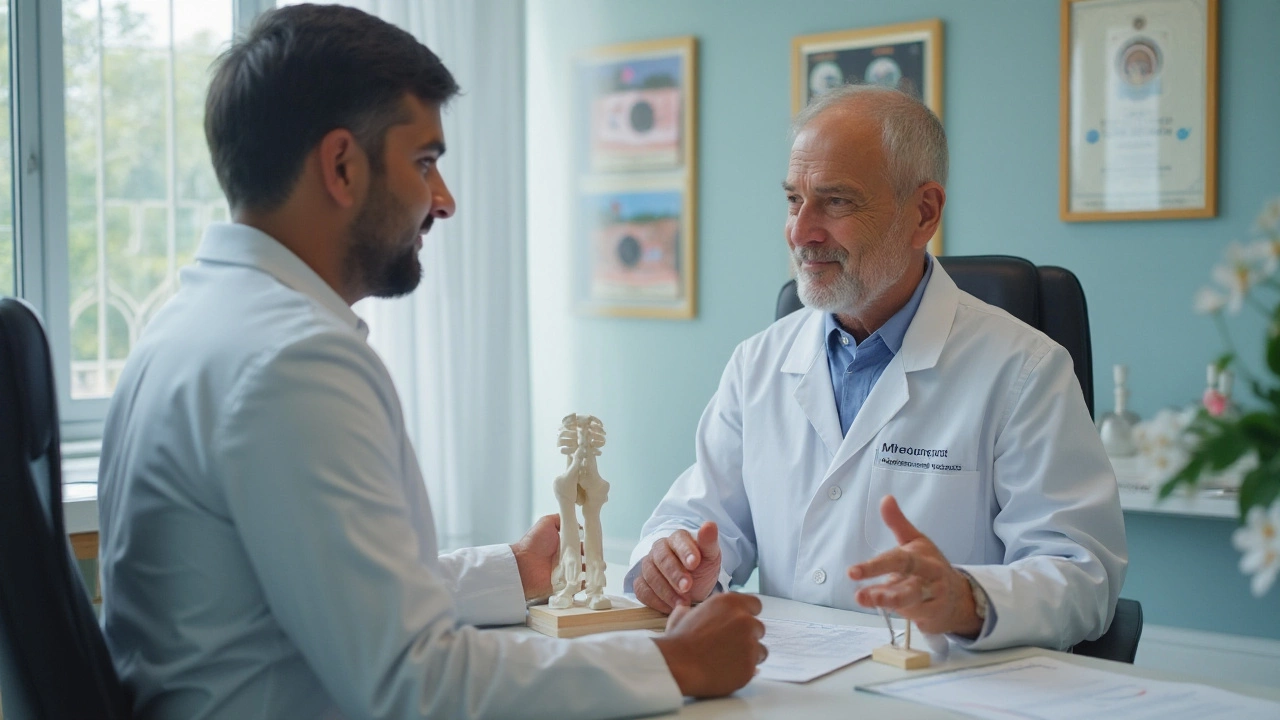The world of medical tourism is as intriguing as it is complex. Patients often find themselves traveling great distances, crossing international borders in pursuit of top-tier medical care. At the heart of this journey lies a crucial question: which doctors are not only the most skilled but also the highest paid?
In this article, we'll uncover the specialties that are known to command the highest salaries. From intricate neurosurgeries to life-saving cardiac procedures, these fields stand out not just for their complexity, but also for their financial rewards. We'll also delve into the factors that determine a doctor's earning potential and provide valuable tips for those considering seeking treatment from highly paid specialists abroad.
- Understanding Medical Tourism
- Top Earning Specialties in Medicine
- Factors Influencing Doctor Salaries
- Popular Destinations for High-Paying Specialists
- Tips for Choosing a Specialist Abroad
Understanding Medical Tourism
Medical tourism is a fascinating phenomenon where patients deliberately travel to other countries to secure medical treatments that might be more expensive or less accessible back home. The globalization of healthcare has given rise to this trend, where borders fade against the promise of superior care or competitive pricing. Understandably, it’s not just about the cost savings, although they are significant and often run up to 50% or more on major operations. It's about access to quality medical facilities and the promise of a world-class service.
Emerging destinations, often in Asia, Eastern Europe, and Latin America, have gained reputations for providing top-grade medical procedures and treatments. Countries like India, Thailand, and Mexico have become prominent players in the field of medical tourism. They offer advanced healthcare infrastructure and highly skilled specialists in fields like cardiology, orthopedics, and dentistry, pulling in international visitors looking for treatment options that balance cost and competence. This shift in patient behavior is reshaping global healthcare landscapes.
According to the Medical Tourism Association, an estimated 14 to 16 million people undertake medical trips every year—which is a testimony to the burgeoning interest in this option. What makes medical tourism truly unique is how it combines healthcare with travel, creating a mix of recuperation and vacation. Hospitals often go the extra mile, providing holistic services that include accommodation and leisure activities for patients and their families. This allure of coupling treatment with travel only amplifies its appeal to those in well-to-do countries seeking both health and exploration.
The World Health Organization has stated, "The rise of medical tourism is a clear indicator of the interconnectedness of the world, where distance isn't a barrier to quality healthcare."
For those contemplating medical tourism, it's crucial to conduct thorough research before making any commitments. Understanding the specific medical licensing, hospital accreditations, and professional qualifications in the destination country is vital. Seeking recommendations from previous patients and considering aftercare options are also crucial steps. Medical tourism is not a decision to be taken lightly, as one must weigh the benefits against potential risks, ensuring that choices made are informed and strategic.
Top Earning Specialties in Medicine
In the realm of healthcare, certain specialties have emerged as financial titans, drawing practitioners not just for the complexity and challenge they offer but also for the rewards. When it comes to the highest paid doctors, the field of neurosurgery often leads the pack. Neurosurgeons are entrusted with the intricate task of operating on the brain and spinal cord. Their work requires years of rigorous training, a steady hand, and an extraordinary understanding of the human nervous system. It’s not surprising then, that their compensation reflects the gravity and difficulty of their work.
Orthopedic surgeons follow closely, with an increasing number of patients requiring joint replacements and spine surgeries. With the aging population around the globe, this field has seen a monumental rise in demand. These specialists often work within medical tourism hotspots, offering surgical remedies to those battling with mobility and pain, which keeps their services highly priced yet immensely sought after.
According to Dr. Henrietta Kowalsky, a renowned orthopedic surgeon, "The demand for orthopedic procedures has doubled in the past decade, and with it, the scope for international practice."
The field of cardiology is another heavyweight. Cardiologists often specialize in treatment without surgery, utilizing a mix of medication, lifestyle adjustments, and non-invasive procedures to manage heart disease and other cardiovascular conditions. With heart disease being one of the leading causes of death globally, the expertise of these doctors is indispensable. A significant portion of their income is derived not only from their ability to diagnose and treat but also from cutting-edge research that continuously reshapes the care landscape.
If you’re inclined toward skin treatments, then dermatology might catch your interest. Often underestimated, this specialty can be incredibly lucrative, especially with the rise of cosmetic dermatology. From acne treatments to anti-aging procedures such as Botox and fillers, dermatologists are increasingly in demand within the realm of aesthetic medicine. This fuels their top-tier status in terms of earning potential.
Rounding out the list is gastroenterology, which deals with the digestive system. These specialists often draw patients from far and wide, particularly those suffering from chronic gastrointestinal issues. A significant contributor to their high pay is the procedure-based nature of the field, such as endoscopies and colonoscopies, which are essential for diagnosis and treatment.
The field of medicine is as diverse as the patients it serves, with high earnings often mirroring the demand and peculiarity of the conditions treated. Whether it's the brain, heart, bones, skin, or stomach, the expertise of these specialists ensures that many are willing to travel across borders for their transformative care.

Factors Influencing Doctor Salaries
Doctor salaries, especially those bestowed upon specialists in the realm of medical tourism, are shaped by a variety of compelling factors. The depth and complexity of their particular field stand as a primary reason. Surgeons who perform intricate procedures, such as neurosurgery and cardiology, earn significantly more due to the advanced expertise required. The high stakes of their work result in a demand for comprehensive education and extensive training, often spanning over a decade. These specialists are not merely healers but also pioneers at the forefront of medical science. An experienced neurosurgeon operating at the zenith of the field is akin to an artist crafting a masterpiece; each movement and decision can drastically alter outcomes, which is why their value is inestimable and salaries reflect this.
Another major factor contributing to doctor salaries is geographical location. Physicians based in high-income countries or major medical tourism destinations tend to command higher wages. This is partly because these regions can attract patients from around the world, driving up demand and enabling practices to charge premium fees. Hospitals in places like the United States or Switzerland, known for pioneering advanced medical technologies, naturally offer higher compensation. However, a surprising twist is the role of medical tourism itself, which can sometimes level the playing field. Countries like Thailand and India may not match Western salaries, yet their lower cost of living paired with a high influx of international patients allows doctors to maintain comfortable and competitive earnings while offering affordable care to patients worldwide.
The reputation and experience of a doctor further determine their earnings. Seniority in the field with a proven track record attracts higher salaries, not just because of experience, but due to the trust and assurance that come with it. Patients are often willing to pay a premium for a surgeon renowned for their success rates or innovative techniques. "In the end, it's not just about knowing the procedure; it's about the confidence and peace of mind you instill in your patients," explained Dr. Maria Vasquez, a leading orthopedic surgeon. This patient trust leads to higher demand for seasoned professionals, often resulting in a growth of their earnings over time.
Market competition also plays a significant role. In fields where the supply of skilled doctors meets the demand, salaries can plateau or even decrease. Conversely, in specialties where demand far outpaces supply, such as pediatric neurology or transplant surgery, salaries tend to rise sharply. The challenge is staying ahead in a constantly evolving field; doctors often pursue continuous education and cutting-edge research to remain competitive, thus enhancing their skill set and value proposition. Institutions highly regard and generously compensate those who can offer specialized services to a clientele that stretches beyond their immediate locale.
One cannot ignore the impact of technological advancements on doctor salaries. As technology becomes an integral part of healthcare, specialists who possess the ability to integrate new technologies into their practice are highly prized. They not only embrace these advancements but often spearhead their integration, shaping the future of their specialties. For specialized surgeons who utilize robotics in surgical procedures, for instance, mastering the technology can significantly boost their appeal and earnings. As medical fields continue to evolve with technology, so too will the nature of earnings, benefitting those who can adapt quickest.
Popular Destinations for High-Paying Specialists
In the realm of medical tourism, certain destinations have risen to prominence due to their exceptional top-paid doctors and cutting-edge medical facilities. The appeal of traveling to these countries often lies in the promise of high-quality care combined with the possibility of significant cost savings. As globalization steadily advances, the question of which countries are home to the most high-paying specialists naturally emerges.
One standout destination in this industry is India. Known for its state-of-the-art healthcare infrastructure, India claims some of the highest-skilled specialists in fields like cardiology and orthopedics. This is coupled with the fact that surgical procedures in India often cost a fraction of what they would in many Western nations. Patients can expect savings ranging from 65% to 90% on treatments without compromising on quality. The presence of internationally accredited hospitals and English-speaking doctors further enhance India’s appeal. As the International Medical Travel Journal notes, "India remains a favored haven for medical tourists looking for affordable, high-quality care in top-notch facilities."
Turkey is another hotspot for those seeking top-paid specialists. Its strategic location bridging East and West, along with its rich cultural heritage, makes it an attractive destination for medical tourists. Especially in the fields of cosmetic surgery and dental care, Turkey excels with its competitive pricing and experienced specialists. Some of the most visited clinics can be found in cities like Istanbul and Ankara, offering packages that often include not just the medical treatment but also accommodation and transport. The affordability combined with the opportunity to explore Turkey's historical sites makes it a compelling choice. According to a report by the Medical Tourism Association, Turkey witnesses approximately 700,000 medical tourists annually, drawn by the expertise and the allure of the country's rich tapestry of experiences.
Meanwhile, Thailand has carved out a substantial niche, particularly in the cosmetic surgery market. As a destination, it is synonymous with picturesque landscapes, exotic culture, and a reputation for hospitality. Its hospitals are known for their modern equipment and highly trained doctors who often speak multiple languages. For medical tourists seeking procedures related to reconstructive and aesthetic surgeries, Thailand offers compelling advantages. Notably, the country is home to the renowned Bumrungrad International Hospital, which features doctors trained in Europe and the United States. A survey by Patients Beyond Borders revealed that up to 50% of medical tourists head to Thailand for cosmetic treatments, underscoring its status as a leader in this specialty.
"With its combination of affordability and top-quality care, Thailand continues to lead as a prime choice for medical tourists worldwide," according to the CEO of Bumrungrad International Hospital.

Tips for Choosing a Specialist Abroad
Choosing the right healthcare specialist abroad is a critical step in the medical tourism journey. It requires careful consideration and research to ensure you receive the best care possible from the highest paid doctors around the globe. One of the first tips is to start early. The earlier you begin your research, the better the chances you have of finding the perfect specialist who aligns with your medical needs and budget. Explore different countries renowned for medical tourism like India, Thailand, and Singapore, which offer a range of high-quality medical services at a fraction of the cost compared to Western countries.
Next, it's essential to check the credentials of the specialist. Ensure they are board-certified and have extensive experience in their field. Many countries boast highly qualified doctors, yet verifying credentials can offer peace of mind. It's helpful to connect with international patient departments at hospitals; they can assist in connecting you to reputable doctors. Another useful resource is online forums and patient reviews, where past patients share their experiences and outcomes, both positive and negative. Incorporating these real-life insights into your research can ease decision-making.
According to the International Medical Travel Journal, "Verification of a doctor’s credentials is a non-negotiable step for any patient considering treatment abroad."
Language is another factor that shouldn't be overlooked. Consider whether there are language barriers that might impact your communication with the doctor. Many high-ranking specialists in top medical tourism destinations are multilingual or have access to certified translators to aid communication. Proper communication ensures that both the patient and doctor clearly understand all expectations and procedures, leading to better overall outcomes. Investigate the hospital or clinic's reputation, looking at not just the doctor’s expertise but the institution's accreditation, technology used, and quality of patient care.
It’s also wise to explore treatment packages offered by hospitals or specialized medical tourism agencies. These packages often bundle the costs of treatment, travel, and accommodation, and some even include follow-up care. Comparing these can reveal value-for-money services that don’t compromise on quality. Be sure to get all these details in writing, and ask about any hidden costs that might later surprise you. Remember, the aim is all-inclusive transparency to avoid unforeseen budget overruns, allowing a well-planned medical journey.
Lastly, consider travel insurance that covers medical tourism. This might not only protect you financially should there be an unforeseen issue but also guarantee a smoother process should any complications arise. Communicate thoroughly with your insurance provider about what is covered specifically regarding medical tourism. With these tips in mind, you can make an informed decision that leads to a positive health outcome while navigating the intriguing world of medical tourism.
January 8 2025 0
Write a comment